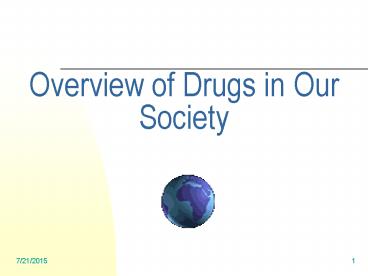Overview of Drugs in Our Society - PowerPoint PPT Presentation
1 / 24
Title:
Overview of Drugs in Our Society
Description:
And dark chocolate contains more of these compounds than ... Dependence/Addiction- person continues to use drug despite negative consequences Withdrawal Tolerance ... – PowerPoint PPT presentation
Number of Views:161
Avg rating:3.0/5.0
Title: Overview of Drugs in Our Society
1
Overview of Drugs in Our Society
2
What Role Do Drugs Play in Our Society- whats
the impact?
3
Is there a Drug Problem?
4
Prevalence of Problem
- 50 of emergency room admissions
- 1/3 of psychiatric admissions
- 25 of completed suicides addicted to alcohol
- Prevalent in psychiatric conditions in
adolescents - 56 of domestic violence cases
- 50 of homicides
- Illicit drug use is major cause of ischemic
strokes - Nearly ½ of all traffic fatalities
5
Hinsdale South Assets Survey Sophomore Stats
December 2009
- Alcohol
- One or more drinks in the last 30 days?
69 NO
6
- Alcohol
- Drunk 1 or more times in the last 2 weeks?
- 79 NO
7
- Tobacco
- Smoke cigarettes 1 or more times in the last 30
days? - 87 NO
8
- Smokeless Tobacco
- Used smokeless tobacco 1 or more times in the
last 12 months - 96 NO
9
- Marijuana
- Used 1 or more times in the last 12 months?
- 79 NO
10
- Other illicit (illegal) drugs
- Used 1 or more times in the last 12 months?
- 96 NO
11
- Driving and Alcohol
- Drove after drinking 1 or more times in the last
12 months? - 96 NO
12
- Driving and Alcohol
- Rode 1 or more times with someone who was
drinking in the last 12 months? - 63 NO
13
Why do people use drugs?
- Curiosity and Availability
- To Get High
- Self-medication
- Confidence
- Energy
- Pain Relief
- Anxiety Control
- Internal/External Peer Pressure
- Social Confidence
- Boredom Relief
- Deal w/ Isolation
- Competitive Edge
14
The worst reason..
- How are Depression and Drug Use Related?
15
Why use? VS. Why continue to use?
16
Dependence/Addiction- person continues to use
drug despite negative consequences
- Psychological- person believes that a drug is
needed in order to feel good or function properly - Physiological- user has a chemical need for the
drug
17
Withdrawal
- When an addictive behavior is
- stopped or an addictive substance
- is withdrawn from use, withdrawal
- symptoms almost always follow.
- Depending on the behavior or substance
- sweating and fever
- restless behavior and anxiety
- abdominal and muscle cramps (even convulsions)
- nausea and vomiting
- diarrhea.
18
Tolerance
- Tolerance can develop with regular use. This
occurs when the person becomes used to taking
drugs of abuse and the drug no longer provides
the same effect as it did when first taken.
Tolerance can occur with regular use of most
drugs of abuse. - A person needs more of a drug to get the same
initial effects.
19
What is a Psychoactive Drug?
- Any substance that directly alters the normal
functioning of the CNS and brain activity - The major classifications of drugs are uppers
(stimulants), downers (depressants), pain killers
(opiates) all-arounders (psychedelics or
hallucinogens).
20
Uppers or Stimulants
- Ex. Cocaine, amphetamines, diet pills, caffeine,
tobacco, ecstasy - Short-term effects energy, HR BP
- Withdrawal and Long-term effects Jitteriness,
anger, depletion of energy, paranoia, damage to
heart, lungs, and BVs, depression, suicidal
thoughts, dependence
21
Downers or Depressants
- Ex Alcohol, barbiturates, GHB, rohypnol.
Opiates can have depressant effects, too. - Short-term effects Depress circulatory,
respiratory, muscular systems. Stronger
opiates initially cause euphoria - Long-term effects nervousness, depression,
dependence, liver damage, malnutrition
22
All-Arounders or Hallucinogens
- Ex Marijuana, LSD, PCP, DXM, ecstasy, psilocybin
mushrooms, and peyote. - Short-term effects Illusions, hallucinations,
confused sensations, heart rate b.p., tremors,
sweating, sleeplessness - Long-term effects bad trips, panic, confusion,
anxiety, schizophrenia, loss of control,
flashbacks
23
Opiates
- Also known as narcotics and pain killers
- Ex Morphine, opium, oxycodone, codeine and
heroin - Abuse causes drowsiness, constipation, slow
breathing, convulsions, coma, death - Infected needle sharing with the use of heroin
can spread HIV and hepatitis B
23
24
Adam Drewnowski at the University of Michigan
researched whether chocolate triggers the
production of opioids. Opioids are chemicals,
such as those found in opium,that produce a
feeling of well-being (euphoria). Drewnowski
found that eating chocolate causes the brain to
produce natural opiates, which dull pain and
increase a feeling of well-being. This may be a
reason why we like to eat chocolate! And dark
chocolate contains more of these compounds than
milk chocolate.

